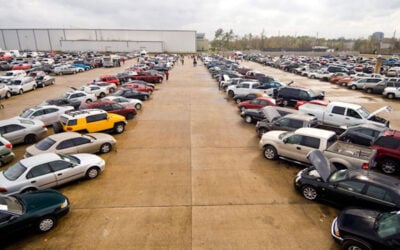When it comes to purchasing a new or used car, the state you’re in can make a significant difference in terms of taxes, fees, and available inventory. We’ll take a look at the best and worst states to buy a car in 2026, focusing on factors like sales tax, insurance costs, documentation fees, and overall car supply. Let’s dive in and see how your state stacks up.
Best States to Buy a Car in 2026
First, let’s explore the states that offer the most advantages when it comes to car buying. States like Alaska, Montana, Oregon, Delaware, and New Hampshire stand out due to their lack of statewide sales tax, as well as generally low fees when buying and registering a car. South Dakota and Iowa are close behind.
Several other states have low state sales tax rates, but many have higher fees that keep them out of our top rankings: Alabama (2%), Colorado (2.9%), Hawaii (4%), Louisiana (4%), Missouri (4.23%), New Mexico (4%), New York (4%), North Carolina (3%), Oklahoma (3.25%), South Dakota (4%), and Virginia (4.15%). However, local taxes can drive costs higher, especially in big cities and affluent suburbs.
Dealerships charge a documentation fee, or “doc fee,” to cover the cost of preparing and filing a sales contract. Many states don’t regulate doc fees, and the amount varies from state to state. In many cases, state taxes and registration fees can outweigh the advantages of low doc fees.
These states have the lowest doc fees in 2025, and as a result, are better states to buy a car in: Minnesota ($75), Arkansas ($110), Oregon ($115), South Dakota ($115), Iowa ($135), Texas ($150), Washington ($150), Indiana ($150). California is also on the list with a very low average doc fee of $85, but the high sales tax and low supply of new cars keeps it far off of the list of best states to buy a car in.
Wondering what the fees are where you live? See Car Dealer Doc Fees by State.
Worst States to Buy a Car in 2026

Now, let’s take a look at the states you might want to avoid when purchasing a vehicle. Documentation fees can be particularly high in Florida, Alabama, Virginia, and North Carolina, with fees ranging from $485 to $995. Florida stands out as one of the worst states for new car purchases, with no cap on doc fees (averaging $995). When it comes to vehicle registration, a few states stand out with costly fees:
- Mississippi: $719 average registration fee
- Wyoming: $616 average registration fee
- Colorado: $595 average registration fee
- Arizona: $564 average registration fee
- California: $524 average registration fee
Alabama, North Carolina, Iowa, and Florida aren’t far behind with registration fees all averaging over $300.
With doc fees, registration fees, sales tax, and new car inventory all taken into consideration, it’s safe to say that the worst states to buy a car are: Mississippi, Florida, California, and North Carolina.
However, Florida’s abundant used car market can make it a better choice for used car buyers, thanks to the state’s older population. On the other hand, flood cars are a much bigger risk in Florida’s used car market.
Which States Have the Most Car Inventory?
It’s important to point out that taxes and fees are only part of the picture. The existing supply of new cars in each state is also critically important. Nationwide, there’s an 93-day supply of new cars as of early 2026. However, some states have might tighter supply. Hover over the interactive map below to see the states with the highest and lowest supply of new cars in 2026.
Use the map above to help you find the regions with the greatest oversupply of new cars. If there’s a state near you with a lot more inventory, it may be worth it to take a little trip in order to have more negotiating leverage.
Car Buying Help Is Here
Ready to outsmart the dealerships? With CarEdge Concierge, we’ll negotiate your car price to lock in big savings. Looking for a DIY option? Shop confidently with CarEdge Pro, our most affordable option for empowered car buying. Looking to lease or trade-in? We can help with that too!
Learn more about CarEdge’s car buying help →














I’m in Florida. If I buy a car out of state will that dealer withhold the sales tax because I am taking the car to FL where I have to pay tax anyway? How does one register a car if bought in a different state?
https://floridarevenue.com/taxes/tips/Documents/TIP_23A01-26.pdf
You only pay the tax where your titling its a miss conception that your are charged in both states. Atleast that the way it is in illinois . You pay the sales tax to your state unless you state tax recipical
I would add that Oklahoma actually ends up being about 4.5%-4.6% tax rate on the purchase price REGARDLESS if you trade a vehicle or not. It is based 100% on the full actual purchase price of the vehicle period (not what you paid after trade any trade). i.e. $46,000 negotiated price x 4.6% = $2,070 in taxes. Get $40,000 in value on that deal. Taxes are STILL $2,070. Super frustrating to not get credit for your trade.
Good to know tax and law by Dave in Oklahoma! Best to go to KS or TX to buy new or used car maybe? Register & tag in Oklahoma?
If I live in Alabama and buy a used car in Florida, does the 6% sales tax I pay in Florida apply to the 2% Alabama use tax? Or what does that process look like? Are there additional fees I will pay in Florida that would not be assessed if purchased the same used car in Alabama? Will I owe Alabama additional fees for buying the car in another state? Thanks for your help!